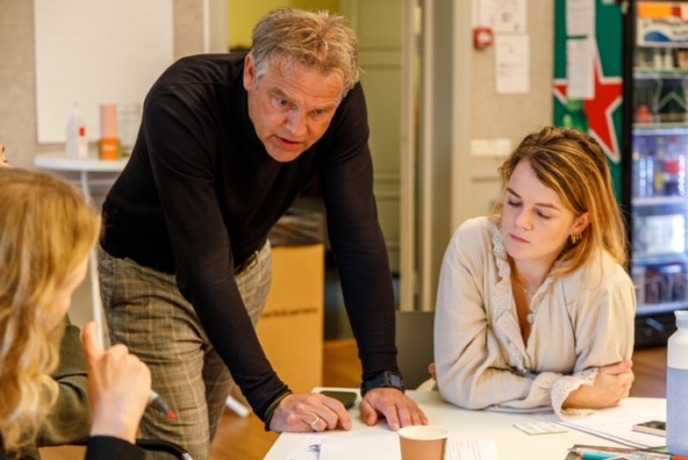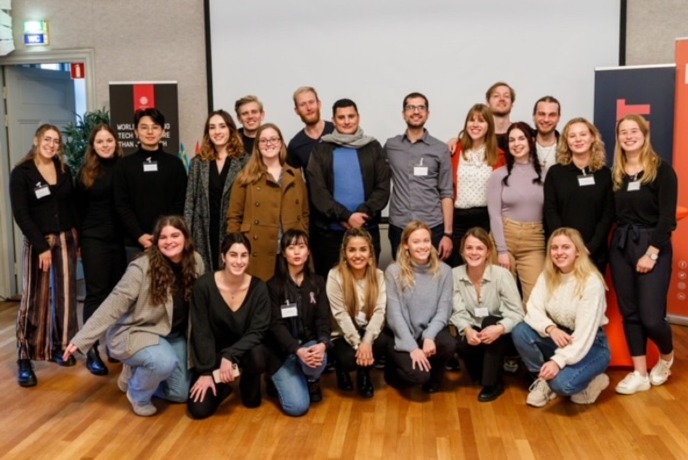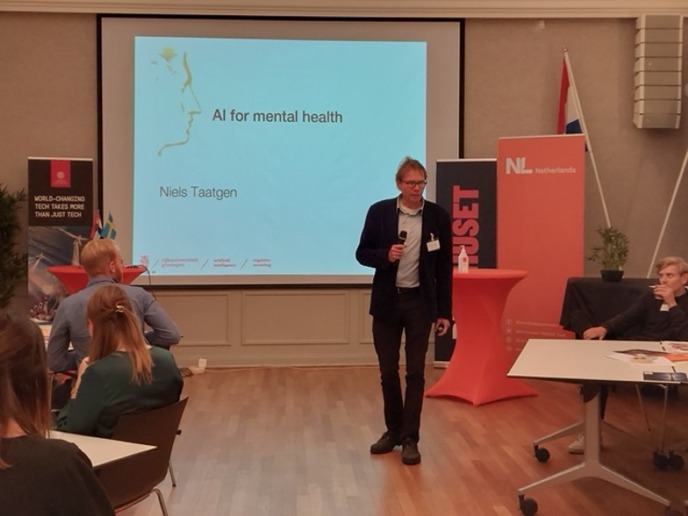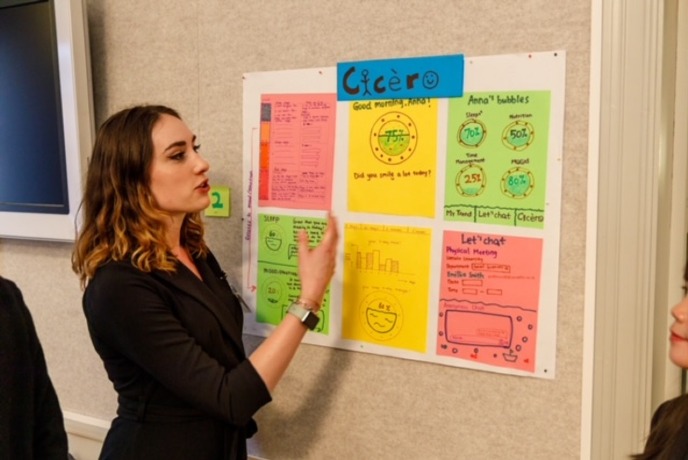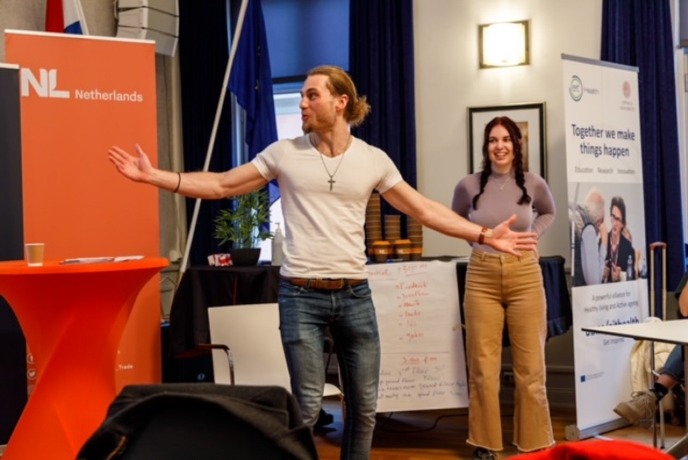GroUP e-Health Challenge
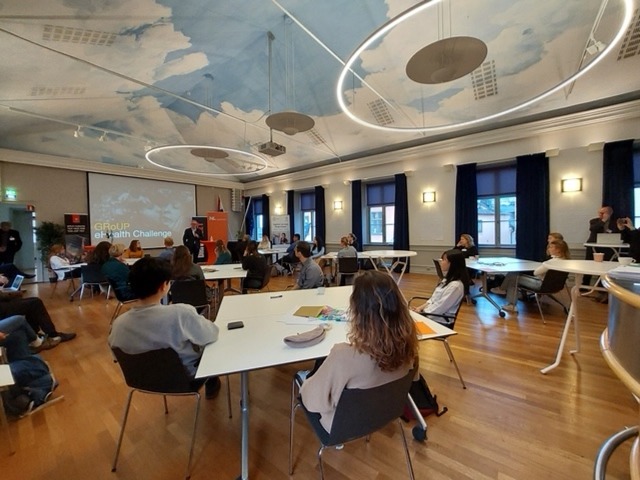
English text below
“GroUp e-Health Challenge”. Een co-creatie van de Rijksuniversiteit Groningen, de universiteit van Uppsala, de projecten ENLIGHT (European university Network to promote equitable quality of Life, sustainability and Global engagement through Higher education Transformation) en EIT Health (European Institute of Innovation and Technology), het ministerie van Economische Zaken en de Nederlandse ambassade in Zweden. De uitdaging tijdens het event is om een innovatieve digitale tool te ontwikkelen die universiteiten in Europa kunnen implementeren om studenten te ondersteunen bij hun werk om het mentale welzijn en de veerkracht van studenten te verbeteren.
Hoewel een meerderheid van onze jongvolwassenen (16-29 jaar oud) hun geestelijk welzijn als goed of zeer goed beoordeelt, zijn er ook duidelijke signalen dat de geestelijke gezondheid en het welzijn van jongeren in de loop van de tijd is afgenomen. Het aandeel jongvolwassenen met verminderd psychisch welbevinden, zorgen of angst is hoger onder studenten aan universiteiten dan onder professionals in dezelfde leeftijdsgroep. Dit leidt tot een grotere hoeveelheid algemeen lijden voor het individu, evenals een toestand die een negatief effect kan hebben op hun studies, professionele bereidheid en toewijding. Het gebruik van digitale technologie om het mentale welzijn en de veerkracht van studenten te ondersteunen is de afgelopen jaren enorm gegroeid met de aanwezigheid van persoonlijke digitale devices - smartphones, fitnesstrackers, tablets, enzovoort.
Op de universiteiten in Europa zijn deze tools echter nauwelijks in gebruik om onze jongvolwassenen door hun jaren als universiteitsstudenten te ondersteunen, op dezelfde manier als veel bedrijven wel doen met digitale, door de werkgever aangeboden gezondheidsaanbiedingen.
Tijdens drie dagen (25, 26 en 27 oktober) in Zweden gingen 24 studenten (afkomstig van de Rijksuniversiteit Groningen en de universiteit van Uppsala) aan de slag in Stockholm om oplossingen te vinden voor deze uitdaging rond het thema e-Health. Interdisciplinaire en internationale teams met studenten vanuit meerdere opleidingen en niveaus (MSc en BSc, IT-technologie, geneeskunde, sociale wetenschappen en economie en bedrijfskunde) worden daar gevormd, met meerdere ondersteuning van experts van buiten en binnen de universiteiten. Het evenement vond plaats in de creatieve omgeving in het Innovation House in de Nederlandse ambassade in Stockholm, waar gastheer en innovatiemanager John Dekker alle dagen klaar stond voor zijn bezoekers.
Maandagavond werd gestart met de opening van de ambassadeur Bengt van Loosdrecht waarna nadere kennismaking, vorming van de teams en meer uitleg over de challenge op het programma stond. Daarna ging het verder met colleges van onder andere Niels Taatgen (RUG), Philip Gratell (Drivhuset) en Mamduh Halawah (VD Zeeds). Het geheel onder de strakke leiding van host Erik Tosterud (eveneens Drivhuset). Dinsdagmorgen bestond het programma uit de uitleg, toelichtingen en oefeningen van Bas Baalmans over onderwerpen als de value proposition, design thinking en het Lean Canvas Model, alles ten doel om de studenten te ondersteunen in hun creatie naar het eindproduct.
Dinsdagmiddag was er voor de groepen studenten (zes in totaal) volop ruimte om experts uit zowel Zweden (offline en aanwezig) en Nederland (online via video-calls) te raadplegen. Experts op het gebied van onder andere zorg, welzijn, digital en AI, denk aan Mindler en Aletta Jacobs School of Public Health van de Universiteit van Groningen. Met lunch en diner tussendoor in het Innovation House van de ambassade werd er dinsdagavond gestart met het werken aan de eindproducten: een poster met toelichting en uitleg over de digitale tool en een pitch van maximaal vijf minuten over de gecreëerde oplossing.
Woensdagmorgen was het vervolgens fine-tunen waarin in een carrousel de zes posters werden toegelicht aan de jury (bestaande uit Niels Taatgen, Ineke Lemmen (ministerie van Economische Zaken), Mamduh Halawah, Bengt van Loosdrecht en Karin Brocki (professor Psychology aan de universiteit van Uppsala). Hierna volgden de pitches van de groepen.
De jury, na kort beraad besloot om de groep bestaande uit Anniek Theuwissen, Annelies Krom (beiden Rijksuniversiteit Groningen) en Fideli Rosell (Uppsala) aan te wijzen als de winnaars van de driedaagse challenge. De groep had een app (genaamd ’Bottie’) ontwikkeld specifiek voor studenten (BSc en MSc) die druk met hun thesis zijn, met alle bijbehorende stress en gevolgen voor welzijn. De drie studenten zijn uitgenodigd om te participeren in de Learning Community Business Value of AI van het GDBC van de Rijksuniversiteit Groningen in april volgend jaar, in combinatie met een bezoek aan de fameuze AI Hub in Berlijn.
De studenten werden vanuit Groningen begeleid door Wijnand Aalderink (Faculteit Economie en Bedrijfskunde), Niels Taatgen (Faculty Science and Engineering en Bas Baalmans (Groningen Digital Business Centre). Ineke Lemmen was mee vanuit Nederland namens het Ministerie van Economische Zaken. De organisatie bestond verder uit Lina Emilsson en Louise Hernander.
--------------------------------------------------------------------------------------------------------------------
“GroUp eHealth Challenge”. A co-creation of the University of Groningen, Uppsala University, the projects ENLIGHT (European university Network to promote equitable quality of Life, sustainability and Global engagement through Higher education Transformation) and EIT Health (European Institute of Innovation and Technology), the ministry of Economic Affairs and the Dutch embassy in Sweden. The challenge during the event was to develop an innovative digital tool that universities in Europe can implement and that can be used by their students to improve their mental well-being and resilience.
While a majority of our young adults (16-29 years old) rate their mental health as good or very good, there are also clear signs that mental health and well-being of our young people has declined over time. The proportion of young adults with reduced psychological well-being is higher among university students than among professionals in the same age group. This leads to a greater amount of general suffering for the individual, as well as that this can adversely affect their studies, professional willingness and dedication. The use of digital technology to support the mental wellbeing and resilience of students has grown tremendously in recent years with the presence of personal digital devices – smartphones, fitness trackers, tablets, and so on. However, in Europe's universities, these tools are hardly used to support students through their college years, in the same way that many companies do with their employers.
During three days (25, 26 and 27 October) in Sweden, 24 students (from the University of Groningen and Uppsala University) went to Stockholm to find solutions to this challenge around the theme of e-Health. Interdisciplinary and international teams with students from multiple studies and levels (MSc and BSc, IT technology, medicine, social sciences and economics and business) are formed there, with multiple support from experts from outside and within the two universities. The event took place in the creative environment of the Innovation House in the Dutch embassy in Stockholm, where host and innovation manager John Dekker was available every day for his visitors.
Monday evening started with the opening of the Dutch ambassador Bengt van Loosdrecht, after further getting-to-know-each-other, formation of the teams and more explanation about the challenge was scheduled. It then continued with lectures by Niels Taatgen, Philip Gratell (Drivhuset) and Mamduh Halawah (VD Zeeds). The whole under the strict leadership of the enthousiastic host Erik Tosterud. On Tuesday morning, the program consisted of an explanation by Bas Baalmans on topics such as the value proposition, design thinking and the Lean Canvas Model, all aimed at supporting the students in their creation towards the end product. Tuesday afternoon there was plenty of room for the groups of students (six in total) to consult experts from both Sweden (offline and present) and the Netherlands (online via video calls). Experts in areas such as healthcare, welfare, digital and AI. Henrik Johanssson of Enlight, the company Mindler and the institute Aletta Jacobs School of Public Health of the University of Groningen were for example those experts. With lunch and dinner in between in the Innovation House of the embassy, work was done on the final deliverables on Tuesday evening, a poster with explanations about the digital tool and a pitch of a maximum of five minutes about the suggested solution.
Wednesday morning the students fine-tuned it and after that the six posters were explained to the jury in a carousel (the jury consists of Niels Taatgen, Ineke Lemmen (Ministry of Economic Affairs), Mamduh Halawah, Bengt van Loosdrecht and Karin Brocki (Uppsala)).
The jury, after a short deliberation, decided to appoint the group consisting of Anniek Theuwissen, Annelies Krom (both University of Groningen) and Fideli Rosell (Uppsala) as the winners of the three-day challenge. The group had an app (named 'Bottie') developed specifically for students (BSc and MSc) who are busy with their thesis, with all the related stress and consequences for well-being. The three students have been invited to participate in the Learning Community Business Value or AI of the GDBC of the University Groningen in April next year, in combination with a visit to the famous AI Hub in Berlin.
The students were supervised from University of Groningen by Wijnand Aalderink (Faculty of Economics and Business), Niels Taatgen (Faculty of Science and Engineering) and Bas Baalmans (Groningen Digital Business Centre). Ineke Lemmen joined from the Netherlands on behalf of the Ministry of Economic Affairs. The organization was also in the good hands of Lina Emilsson and Louise Hernander (both Uppsala).
